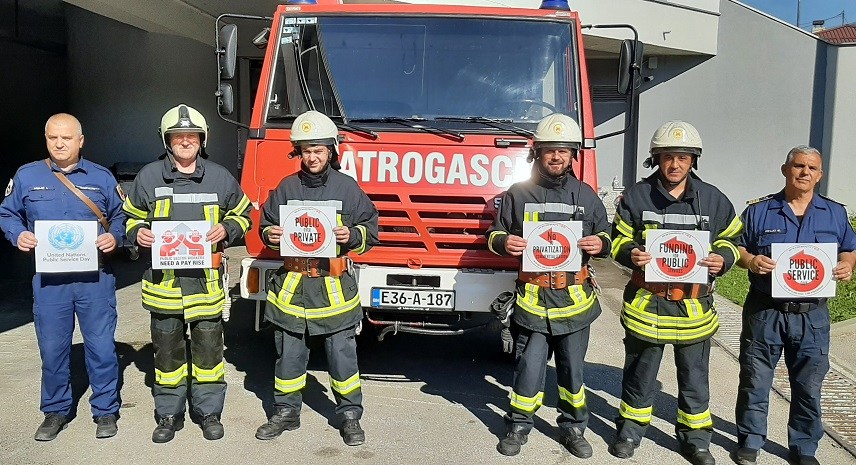23rd June was first recognised as Public Service Day by the UN in 2002, but it has received significantly more attention the last two years, as people have expressed their appreciation for public service workers across the globe who have been on the front line of the pandemic. Regrettably however, these symbolic gestures have not translated into better pay or conditions in public services, and the gratitude expressed, especially by governments and policy makers, is wearing thin.
Despite all the applause, many governments are stuck in old ways of thinking with regards to the financing of the public sector. Despite acknowledging that the austerity-based response to the 2008 banking crisis undermined our public services and ability to respond to the pandemic, many decision makers are putting debt reduction on the agenda again. At the end of 2020 for example, almost one year since the outbreak of the pandemic, the European Commission called into question Member States’ decisions to increase wages for health care workers, because these well-deserved pay increases could mean higher public debt. This was precisely the kind of policy that left our societies so ill-prepared to absorb the shock of the pandemic, and it is this kind of ideology that we need to leave behind in order to build a more resilient Europe.
Public services are the backbone of our societies. Whether in times of crisis or not, workers in health and social care, water and sanitation, education, tax administrations, prisons, electricity, transport and other public services are the ones who keep our communities functioning. But a decade of austerity policies meant that these services were stretched thin long before the outbreak of the pandemic. Not only has this resulted in a high level of burnout amongst staff, it also means that they are unable to deliver the quality of public services needed for those who rely on them.
The pandemic made this particularly visible in health and care services. The first wave was characterised by a shortage of resources, including Personal Protective Equipment, beds in Intensive Care Units, and trained staff, which left several hospitals across Europe unable to cope. As we now know, this tragically resulted in many preventable deaths, but the full long-term impact is yet to be seen. In the years to come, health services will struggle to catch up with the backlog of patients who had treatments postponed due to the pandemic. Staff shortages will be exacerbated due to the levels of burnout and long-COVID among existing staff, and the time it takes to train new staff.
In order for public health services to be able to respond to the growing list of postponed treatments and provide quality care, it is critical to improve retention rates and the attractiveness of nursing and other health care professions. In the short term, higher pay, better conditions, and access to psychosocial support could dissuade workers from leaving the sector. In the longer term, there needs to be a more systematic approach to increase investment in public health services to ensure adequate levels of well trained staff across health care professions. We need to look seriously at how we want to deliver social care, for children and the young, for the elderly, and for people with disabilities. Providing social care for profit, and prioritising the interests of shareholders over the workers and users of care services, is not the way to realise the right to care now enshrined in the EU pillar of social rights.
It is not only the health and care sectors which have suffered from a decade of underfunding. Budget cuts in other public services, from prisons to wastewater to tax administrations, have made it increasingly difficult for workers in these sectors to deliver safe and quality services. If we are to recover and build a more resilient Europe, emergency funding and short-term relief measures are not enough. The pandemic has provided us with a unique opportunity to do things differently and pursue a bold new chapter in policy making. Europe must seize it.
It is time to challenge the myth that there is not enough money to invest in public services. The world loses $427 billion in tax each year to international corporate tax abuse and private tax evasion. This is equivalent to one nurse's annual salary every single second. The money is there, but it can only benefit the public interest if large corporations and the wealthy are made to pay their fair share of tax. For this, there needs to be a dramatic shift in the way our societies are run. National governments and EU institutions must take bold action and prioritise workers, people and planet before profit.
Mette Nord, EPSU President and Jan willem Goudriaan, EPSU General Secretary

